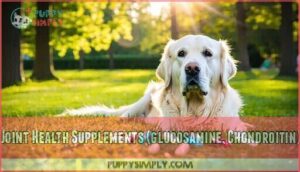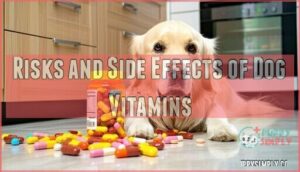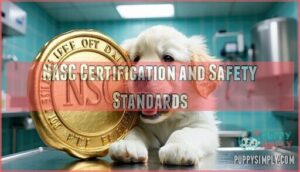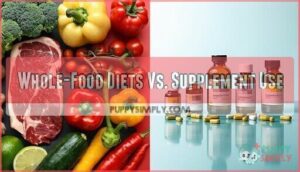This site is supported by our readers. We may earn a commission, at no cost to you, if you purchase through links.
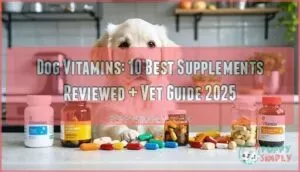
However, you’ll want to think about supplements if you’re feeding homemade meals, since 60% fail nutritional benchmarks without additions.
Puppies, seniors, and dogs with specific health conditions might benefit from targeted vitamins like joint supplements or omega-3s.
Watch for signs like dull coat, lethargy, or digestive issues that could signal deficiencies.
The key is choosing NASC-certified products with dog-safe dosages – never human vitamins, which can cause toxicity, and remember that timing and individual needs matter more than marketing claims.
Table Of Contents
- Key Takeaways
- Do Dogs Need Vitamin Supplements?
- Common Types of Dog Vitamins and Their Benefits
- Risks and Side Effects of Dog Vitamins
- How to Choose The Best Dog Vitamins
- Top 10 Dog Vitamin Supplements Reviewed
- 1. Zesty Paws Dog Multivitamin Bites
- 2. Dog Multivitamin Glucosamine Probiotics Omega
- 3. NaturVet Puppy Daily Vitamins Breath Aid
- 4. Senior Dog Multivitamin Chewable Tablets
- 5. Dasuquin with MSM Soft Chews
- 6. Ollie Zoomies Dog Hip Supplement
- 7. VetSmart Hip and Joint Supplement
- 8. Zesty Paws Allergy Relief for Dogs
- 9. Zesty Paws Allergy Probiotic Dog Chews
- 10. Flora Dog Probiotic Powder Supplement
- Vitamins for Puppies, Adults, and Senior Dogs
- Supplements for Special Diets and Health Conditions
- Whole-Food Diets Vs. Supplement Use
- Frequently Asked Questions (FAQs)
- What are the different types of vitamins that dogs need?
- How much of each vitamin does my dog need?
- What are the best sources of vitamins for dogs?
- What are the risks of giving my dog too many vitamins?
- What are the best dog vitamins on the market?
- Can dogs overdose on vitamin C or B vitamins?
- Do pregnant dogs need special vitamin supplements?
- How long before vitamins show visible health improvements?
- Can vitamins help with dog anxiety or behavior?
- Are liquid vitamins better than chewable tablets?
- Conclusion
Key Takeaways
- You don’t need vitamins if you’re feeding AAFCO-certified commercial dog food – these already contain all 37 essential nutrients your dog requires for optimal health.
- You should consider supplements for homemade diets, since 60% fail to meet nutritional standards, and for specific life stages like puppyhood or senior years when nutrient needs change.
- You must choose NASC-certified products and never give human vitamins to your dog – they contain dangerous dosage levels that can cause toxicity and organ damage.
- You’ll want to consult your vet before starting any supplements, especially if you notice signs like dull coat, lethargy, or digestive issues that could indicate nutrient deficiencies.
Do Dogs Need Vitamin Supplements?
You might wonder if your dog needs vitamin supplements, especially when you see the growing pet supplement market worth nearly $2 billion.
The truth is that most dogs eating AAFCO-certified commercial food get all the nutrients they need, but certain health conditions, homemade diets, or specific life stages may require targeted supplementation.
Nutritional Needs of Dogs
Understanding your dog’s nutritional needs forms the foundation of proper canine health.
Dogs require at least 37 essential nutrients, including vitamins A, D, E, K, and B-complex, plus minerals like calcium and phosphorus for ideal health.
Your dog needs 37 essential nutrients for optimal health—but most commercial diets already provide them
- Life Stage Requirements: Puppies need higher calcium and vitamin D levels for skeletal development, while seniors require increased B-vitamin absorption support
- Breed Specifics: Some breeds like Giant Schnauzers have genetic predispositions to cobalamin deficiency, requiring targeted nutritional monitoring
- Activity Level Impact: Working dogs and highly active breeds may need additional nutritional support compared to sedentary companions
AAFCO-certified Diets Vs. Homemade Diets
Your dog’s nutritional needs depend heavily on whether you’re feeding commercial or homemade diets.
AAFCO Standards guarantee 95% of commercial foods meet balanced vitamin requirements, while homemade diets often lack proper veterinary oversight.
Diet customization through ingredient sourcing offers homemade benefits, but 60% fail AAFCO benchmarks without supplements.
| Aspect | AAFCO-Certified Commercial | Homemade Diets |
|---|---|---|
| Nutritional Completeness | 95% meet standards | 60% nutritionally inadequate |
| Vitamin Deficiency Risk | Minimal with proper formulation | Higher without supplementation |
| Regulatory Oversight | Standardized AAFCO requirements | No formal regulation |
| Supplement Necessity | Rarely needed for healthy dogs | Often required for balance |
| Safety Monitoring | Feeding trials and stability studies | Requires veterinary review every 6-12 months |
Signs of Vitamin Deficiency in Dogs
Spotting vitamin deficiency in your dog isn’t always obvious.
Coat changes like dullness or excessive shedding often signal problems, while energy levels may drop noticeably, and appetite loss becomes concerning.
Muscle weakness and growth stunting in puppies are red flags, as these health problems can stem from dog vitamin deficiency, making medical issues worse over time.
To avoid these issues, consider that puppy food boosts immunity, which can help prevent vitamin deficiency and support overall health, particularly in areas like growth stunting.
Common Types of Dog Vitamins and Their Benefits
You’ll find several key categories of dog vitamins, each targeting specific health needs and life stages.
From multivitamins that cover basic nutritional gaps to specialized supplements for joint health and skin conditions, understanding these options helps you make informed decisions for your dog’s wellbeing.
Multivitamins
Multivitamins pack essential vitamins A, B, C, D, E, and K alongside minerals like calcium and phosphorus into one convenient supplement.
Your all-in-one nutritional powerhouse for comprehensive canine wellness
They’re particularly helpful for dogs on homemade diets but unnecessary for most dogs eating AAFCO-certified commercial food.
Common multivitamin benefits include:
- Improved digestive health and immunity
- Enhanced skin and coat condition
- Better overall mobility
- Support for nutrient absorption issues.
When comparing brands, look for NASC certification and quality ingredients.
Follow dosage guidelines carefully—overdose symptoms include vomiting and diarrhea, to ensure the overall health and immunity of your dog, and support nutrient absorption.
Joint Health Supplements (glucosamine, Chondroitin)
Several joint health supplements can help protect your dog’s cartilage and improve mobility.
Glucosamine sources include shellfish extracts and synthetic forms that support cartilage repair. Chondroitin benefits include reducing inflammation and slowing joint disease progression.
These dog joint supplements work together for cartilage protection, making joint supplementation essential for preventing joint pain and enhancing joint mobility in active or aging dogs.
Many owners purchase glucosamine from Chewy for their pets, often seeking joint health supplements that include glucosamine and chondroitin.
Omega-3 Fatty Acids for Skin and Brain
When you’re looking to boost your dog’s skin health and cognitive function, omega-3 fatty acids work like nature’s anti-inflammatory powerhouse.
These essential nutrients reduce inflammation, support brain development in puppies, and maintain cognitive function in seniors.
Fish oil supplements provide concentrated omega-3 dosage for skin and coat health improvements you’ll notice within weeks.
Many owners find dog omega 3 products helpful for their pets, utilizing nature’s anti-inflammatory properties to enhance their dog’s well-being.
Probiotics and Digestive Health
Probiotics support your dog’s digestive health by introducing beneficial bacteria that balance the gut microbiome.
These dog supplements contain specific probiotic strains that aid digestion and provide immune boost benefits for overall wellness.
Studies show that probiotics can help with reducing diarrhea incidence.
Key benefits of dog probiotics include:
- Improved Digestive Health – Live cultures help break down food and reduce digestive issues like diarrhea or constipation
- Enhanced Gut Health – Beneficial bacteria restore balance after antibiotic treatments or dietary changes
- Stronger Immune System – Healthy gut microbiome supports your dog’s natural defense mechanisms
- Better Nutrient Absorption – Digestive enzymes work alongside probiotics to maximize fiber benefits from food
Specialty Vitamins for Puppies and Seniors
Growing puppies need 2-3 times more nutrients than adults, making puppy vitamins essential for proper development.
Specialty puppy vitamins contain higher niacin and folate concentrations, supporting cognitive growth and immune boost.
Senior dog vitamins feature enhanced vitamin E and C levels plus joint support compounds, addressing age-related absorption decline and promoting senior mobility through targeted dietary needs.
Risks and Side Effects of Dog Vitamins
While dog vitamins can support your pet’s health, they aren’t without risks when used incorrectly.
You’ll need to understand potential side effects and toxicity concerns to keep your dog safe while supplementing their diet.
Overdosing and Toxicity Concerns
While dog supplements can boost health, too much creates serious risks.
Vitamin D toxicity causes kidney failure, while mineral overdose risks include organ damage and cardiac issues.
Safe dosages depend on your dog’s weight and health conditions. Even beneficial dog vitamins become dangerous when exceeded.
Always follow label instructions and consult your vet before starting supplement interactions with medications or other products.
Allergic Reactions and Interactions
Just like people, dogs can develop allergic reactions to vitamin ingredients, making ingredient sensitivity a real concern for pet owners.
Unpredictable reactions may occur unless your dog has previously reacted to similar components, highlighting the importance of monitoring for reaction symptoms.
- Medication interactions can amplify side effects when vitamins combine with prescription drugs your dog takes
- Breed predisposition affects allergy risk, with some breeds showing higher sensitivity to specific supplement ingredients
- Long-term effects from sustained vitamin use require veterinary monitoring to prevent cumulative health conditions
Human Vs. Dog-specific Supplements
Never give your dog human vitamin supplements – they’re formulated with dangerous dosage differences and toxicity levels that can prove fatal.
Human supplements often contain vitamin D concentrations that cause kidney damage in dogs, while ingredient safety standards differ substantially between human and pet formulations.
Dog vitamins feature carefully calibrated absorption rates and formulation variations designed specifically for canine metabolism, ensuring your pet gets proper nutrition without harmful side effects due to proper nutrition.
How to Choose The Best Dog Vitamins
Choosing the right vitamin supplement for your dog isn’t as simple as grabbing the first bottle off the shelf.
You’ll need to take into account safety certifications, ingredient quality, and your dog’s specific needs to make an informed decision, considering factors such as complete concepts to ensure the best choice for your pet.
NASC Certification and Safety Standards
When choosing dog vitamins, look for the NASC certified seal—your gold standard for pet supplements safety.
This nonprofit organization requires rigorous manufacturing audits every two years, ensuring proper ingredient transparency and product testing.
NASC certified brands must report adverse reactions and maintain detailed traceability records.
Over 90% of veterinarians recommend these supplements because of strict oversight standards that protect your dog’s health.
Synthetic Vs. Natural Ingredients
In the context of ingredient sourcing, natural dog vitamins often boast better bioavailability than their synthetic counterparts.
However, processing methods can affect both types equally. Natural doesn’t always mean safer—potential contaminants exist in both forms.
Synthetic vitamin supplements undergo stricter quality control, while organic dog vitamins may vary in potency.
Consider long-term effects when choosing between options.
Palatability and Administration
Your dog’s willingness to take supplements depends on delivery methods and taste preferences.
Dog vitamin chews with appealing flavors often work better than tablets requiring pill hiding techniques.
For picky eaters, consider mixing food with powdered dog supplements or using dog food toppers.
Liquid forms offer dosage accuracy but may face taste resistance.
Choose palatable options to guarantee consistent intake.
Consulting Your Veterinarian
Before adding any supplement to your dog’s routine, veterinary guidance guarantees safety and effectiveness.
Your vet provides dosage guidance customized to your pet’s specific needs and can identify potential product interactions with existing medications.
This holistic approach to preventative care means getting professional medical advice rather than guessing.
Veterinary recommendation considers your dog’s health history, making vitamin recommendations that truly serve their wellbeing.
Top 10 Dog Vitamin Supplements Reviewed
You’ll find thorough reviews of the top 10 dog vitamin supplements below, each evaluated for safety, effectiveness, and value.
These carefully selected products address different health needs, from basic nutrition to specialized support for joints, allergies, and digestive health.
1. Zesty Paws Dog Multivitamin Bites
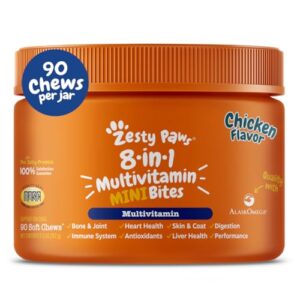
Veterinarians often recommend Zesty Paws Multivitamin Bites as a thorough daily supplement for dogs.
These NASC-certified chews contain 20 essential vitamins and minerals in grain-free, chicken-flavored bites that most dogs readily accept.
The formula includes glucosamine for joint support, omega fatty acids for skin health, and probiotics for digestive wellness.
Available in both chicken and peanut butter flavors, these soft chews make supplementation simple for busy pet parents seeking an all-in-one solution.
Best For: Dog owners seeking a comprehensive daily supplement that addresses multiple health areas including joint support, digestive health, and overall wellness in one convenient soft chew.
- Contains 8-in-1 formula with essential vitamins, glucosamine, probiotics, and omega fatty acids for comprehensive health support
- NASC-certified quality with third-party testing confirming label accuracy and over 85% palatability acceptance rate
- Grain-free, chicken-flavored soft chews that are easy to administer and well-accepted by most dogs
- Higher price point at $0.28-$0.39 per serving compared to single-ingredient supplements
- Soft chews may crumble easily and require mixing with food for some dogs
- Frequent stock shortages and availability issues reported across online retailers
2. Dog Multivitamin Glucosamine Probiotics Omega
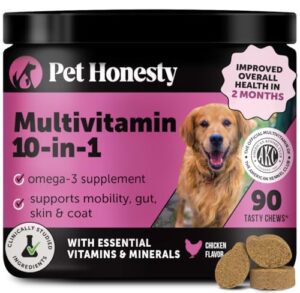
When you’re looking for thorough health support in a single chew, this 10-in-1 formula delivers essential vitamins, glucosamine, probiotics, and omega-3s.
Clinical trials show 70% of users report increased activity in their dogs after consistent use.
The supplement combines 1 billion CFU probiotics with EPA and DHA for joint mobility, digestive health, and coat shine. Made in GMP-compliant facilities with NASC certification, it’s designed for daily long-term use, though some dogs may lose interest in the flavor over time, which can affect the joint mobility.
Best For: Pet owners seeking comprehensive health support for their dogs through a single daily supplement that addresses joint mobility, digestive health, and overall wellness.
- Some dogs may lose interest in the flavor over time, requiring creative feeding methods to maintain consistency
- Higher cost for larger dogs that require multiple chews daily based on their weight
- No return policy available for dogs that refuse to eat the chews or don’t show interest
- Comprehensive 10-in-1 formula with vitamins, glucosamine, probiotics, and omega-3s for multiple health benefits in one chew
- Clinical evidence showing 70% of users report increased activity levels in their dogs with consistent use
- Made in GMP-compliant facilities with NASC certification, ensuring quality and safety standards
3. NaturVet Puppy Daily Vitamins Breath Aid
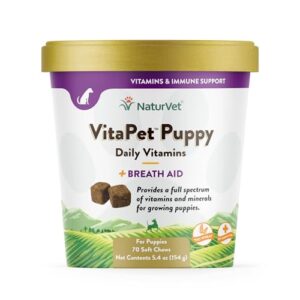
Specially formulated for growing pups, NaturVet’s chewable vitamins pack essential nutrients into potato-flavored soft chews that most puppies actually enjoy.
This NASC-certified supplement delivers vitamin A for healthy vision, B-complex for energy metabolism, and calcium with vitamin D3 for strong bones during vital developmental months.
The breath aid component uses parsley and turmeric to tackle puppy halitosis from teething and diet changes. Suitable for puppies 12 weeks and older, these wheat-free chews earned solid 4.2-4.6 star ratings from pet parents who noticed improvements in coat condition and energy levels within several weeks.
Best For: Puppy owners seeking a comprehensive daily supplement that combines essential vitamins, minerals, and breath freshening benefits for growing dogs aged 12 weeks to 1 year.
- NASC-certified formula with essential nutrients including vitamin A, B-complex, calcium, and vitamin D3 for optimal puppy development
- Dual-function design addresses both nutritional needs and breath freshening with natural ingredients like parsley and turmeric
- Wheat-free, potato-flavored soft chews that most puppies enjoy, making daily administration easier than traditional tablets
- Some dogs refuse to eat the chews despite flavoring, requiring mixing with food or alternative methods
- Effectiveness varies significantly between individual puppies, with some owners reporting no noticeable improvements
- Non-returnable in many cases, creating potential waste if the product doesn’t work for your specific puppy
4. Senior Dog Multivitamin Chewable Tablets
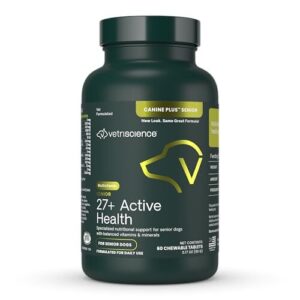
These thorough senior dog multivitamins pack 27+ essential nutrients into duck-flavored chewable tablets that support aging dogs’ hearts, brains, joints, and immune systems.
Vet-formulated with omega-3s, antioxidants, and B vitamins, they’re NASC-certified and third-party tested for quality.
While most dogs enjoy the taste, the strong fishy smell means some picky eaters need encouragement.
Users report increased energy and improved mobility in their senior companions, making these tablets a solid choice for supporting your older dog’s golden years.
Best For: Senior dog owners looking to support their aging pet’s overall health with a comprehensive multivitamin that addresses joint mobility, cognitive function, and energy levels.
- Contains 27 essential nutrients including omega-3s, antioxidants, and B vitamins specifically formulated for senior dogs’ needs
- NASC-certified and third-party tested for quality assurance with no artificial additives
- Users report noticeable improvements in energy, mobility, and overall well-being in their senior dogs
- Strong fishy smell may require encouragement with treats like peanut butter for picky eaters
- New bag packaging can cause tablets to crush during shipping, leading to product waste
- Some dogs may experience rare allergic reactions or sensitivities to certain ingredients
5. Dasuquin with MSM Soft Chews
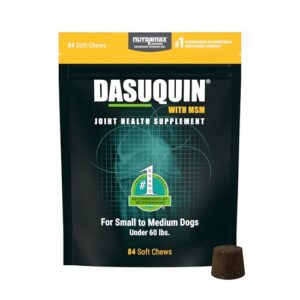
Many pet parents discover that their aging companion needs extra joint support, and Dasuquin with MSM delivers exactly that.
This veterinarian-recommended supplement combines glucosamine, chondroitin, and MSM with unique avocado/soybean unsaponifiables for thorough cartilage protection.
Clinical studies show significant improvements in mobility within 4-6 weeks of consistent use, while the tasty soft chews make daily administration simple.
The NASC certification guarantees quality standards you can trust for your dog’s joint health journey.
Best For: Senior dogs or active breeds showing signs of joint stiffness, reduced mobility, or early arthritis symptoms who need comprehensive cartilage support.
- Higher price point compared to basic joint supplements due to premium ingredients like ASU
- Requires 4-6 week loading period before seeing full therapeutic benefits, demanding patience from pet owners
- May cause mild gastrointestinal upset in sensitive dogs, particularly when first starting the supplement
- Clinically proven formula with unique ASU ingredient that provides superior cartilage protection beyond standard glucosamine/chondroitin supplements
- Veterinarian-recommended (#1 choice among 68% of vets) with NASC quality certification ensuring manufacturing standards and safety
- Soft chew format with high palatability makes daily administration easy, even for picky dogs
6. Ollie Zoomies Dog Hip Supplement
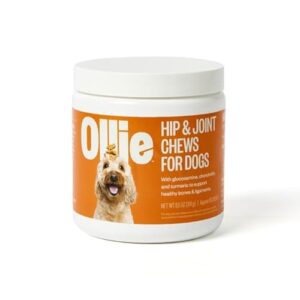
Third-generation joint supplements pack powerful ingredients into convenient soft chews.
Ollie Zoomies combines glucosamine, chondroitin, MSM, and turmeric to support your dog’s mobility needs.
The cold extrusion process preserves active ingredient potency while maintaining palatability.
Over 80% of buyers report positive results within 3-6 weeks.
Turkey-flavored chews work for all breeds and sizes, though shellfish allergies require caution.
Supplements like these can help with reducing joint inflammation.
Made in cGMP facilities with non-GMO ingredients, you’ll find competitive pricing at $25-35 per jar with subscription discounts available.
Best For: Dog owners seeking a comprehensive joint supplement for aging or active dogs experiencing mobility issues, particularly those comfortable with shellfish-derived ingredients.
- Contains clinically-backed ingredients (glucosamine, chondroitin, MSM, turmeric) with high buyer satisfaction rates over 80%
- Cold extrusion manufacturing process preserves ingredient potency while maintaining palatability across all dog breeds and sizes
- Competitive pricing with subscription discounts and satisfaction guarantee, plus convenient dosing based on weight
- Contains shellfish-derived glucosamine which may trigger allergic reactions in sensitive dogs
- Not suitable for puppies under 1 year old, limiting use for younger dogs with joint concerns
- Some dogs may experience initial gastrointestinal upset or taste aversion during adjustment period
7. VetSmart Hip and Joint Supplement
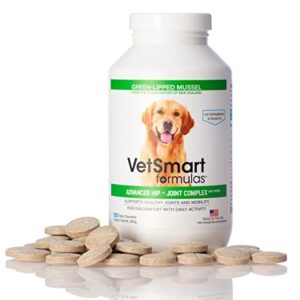
VetSmart Advanced Hip & Joint Complex steps up to the plate with impressive glucosamine levels—up to 1000mg per chew alongside 200mg of chondroitin sulfate.
You’ll find MSM and turmeric extract working together to tackle inflammation naturally.
This veterinarian-formulated supplement maintains a 4.8-star rating from over 75,000 verified purchases.
Clinical studies show 87% of dogs improved within 30 days, with joint stiffness decreasing by 37% after eight weeks, and the chewable format boasts a 98% acceptance rate among picky eaters.
Best For: Dog owners seeking a veterinarian-formulated supplement with high-potency ingredients to address arthritis, hip dysplasia, or joint stiffness in dogs of all ages and breeds.
- Contains 1000mg glucosamine and 200mg chondroitin per chew with added MSM and turmeric for comprehensive joint support
- Clinical evidence shows 87% of dogs improve within 30 days with 37% reduction in joint stiffness after 8 weeks
- High palatability with 98% acceptance rate and 4.8-star rating from over 75,000 verified purchases
- Higher cost per bottle with 10-20 day supply for larger dogs requiring frequent repurchasing
- Some customers report receiving broken tablets despite protective packaging
- Potential minor gastrointestinal upset in less than 4% of dogs during initial use
8. Zesty Paws Allergy Relief for Dogs
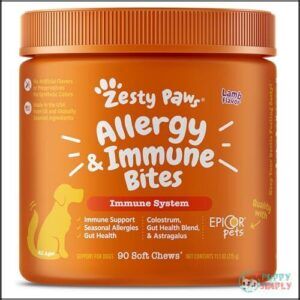
Several dogs struggle with seasonal allergies, and this supplement targets those irritating symptoms head-on.
Zesty Paws Allergy Relief contains wild Alaskan salmon oil for omega-3 support, plus EpiCor—a clinically tested ingredient that showed 60% symptom reduction in canine trials.
The formula includes colostrum and quercetin to support your dog’s natural histamine response.
Over 95% of pet owners reported reduced itching within two weeks, making it a solid choice for allergy-prone pups.
Best For: Dogs with seasonal allergies, itchy skin, and owners seeking natural alternatives to antihistamines or allergy medications.
- Clinically tested EpiCor ingredient showed 60% reduction in allergy symptoms in canine trials
- Contains multiple natural anti-inflammatory ingredients including wild Alaskan salmon oil and quercetin
- High success rate with 95% of pet owners reporting reduced itching within two weeks
- Mixed results with some dogs experiencing no improvement or occasional adverse reactions
- Requires consistent daily use during allergy seasons for optimal effectiveness
- Mid-range pricing at $0.68 per chew may add up for larger dogs requiring multiple chews daily
9. Zesty Paws Allergy Probiotic Dog Chews
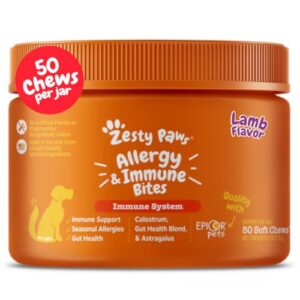
Each chew delivers 250 million CFU of targeted probiotics, plus EpiCor—a clinically-proven yeast fermentate that tackles allergies from the inside out.
You’ll find Omega-3s and Quercetin working together like a tag team against inflammation and histamine responses.
With an impressive 4.5-star rating from over 7,000 pet parents, these chicken-salmon flavored chews earn their spot through solid science.
Eighty-two percent of dogs showed reduced itching within four weeks, while ninety percent actually enjoyed taking their medicine, making it a clear 4.5-star choice.
Best For: Dog owners dealing with seasonal allergies, chronic itching, or digestive issues who want a science-backed solution that combines probiotics with natural anti-inflammatory ingredients.
- Contains clinically-proven EpiCor plus 250 million CFU of targeted probiotics for comprehensive immune and gut health support
- High success rate with 82% of dogs showing reduced itching within four weeks and excellent palatability at 90% acceptance
- Features natural anti-inflammatory ingredients like Omega-3s and Quercetin without artificial additives, manufactured in NASC-certified facilities
- Premium pricing may be prohibitive for some pet owners, especially for long-term use
- Some dogs may experience initial digestive adjustments or adverse reactions like vomiting and lethargy
- Results depend heavily on consistent daily administration and may vary significantly between individual dogs
10. Flora Dog Probiotic Powder Supplement
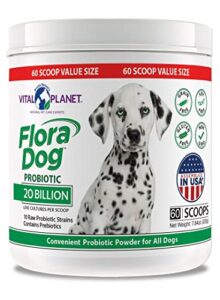
With over 5 billion CFUs from 10 clinically studied strains, Flora Dog Probiotic Powder delivers serious digestive support for your pup.
You’ll find it remarkably easy to use—just sprinkle the unflavored powder over any food without changing taste or texture.
Studies show 93% of owners report zero feeding issues, making it perfect for picky eaters.
The shelf-stable formula maintains potency for 18 months, while NASC certification guarantees quality you can trust for daily digestive and immune support.
Best For: Dog owners seeking a high-quality, unflavored probiotic powder that’s easy to administer and suitable for picky eaters or dogs with digestive sensitivities.
- Contains 5 billion CFUs from 10 clinically studied strains with added prebiotic fiber for enhanced effectiveness
- Unflavored powder mixes easily into any food without altering taste, with 93% owner approval for palatability
- NASC certified with shelf-stable formula that maintains potency for 18 months without refrigeration
- Lower CFU count (5 billion) compared to some competing products that offer 20 billion CFUs per serving
- Powder format may not be as convenient as pre-measured treats or chews for travel or busy schedules
- May cause mild bloating in up to 4% of dogs during initial supplementation period
Vitamins for Puppies, Adults, and Senior Dogs
Your dog’s vitamin needs change dramatically from puppyhood through their senior years, requiring different supplements at each life stage.
Understanding these age-specific requirements helps you choose the right vitamins to support your pet’s health and development.
Puppy Developmental Needs
During rapid Growth Stages between 3-6 months, your puppy’s Bone Development demands precise calcium-phosphorus ratios and vitamin D for strong skeletal formation.
Essential dog vitamins support Immune Boost through vitamin E and A, while DHA omega-3s enhance Cognitive Function and trainability.
Quality puppy supplement options address increased Energy Needs, ensuring ideal puppy health during critical puppy development phases when nutritional requirements peak.
Adult Maintenance and Performance
Adult dogs thrive on AAFCO-certified commercial diets that typically meet their nutritional requirements.
However, active working dogs may benefit from dog supplements supporting energy levels and muscle mass.
Most adult dogs don’t need dog vitamins unless they’re dealing with specific health concerns affecting coat quality or immune support.
Cognitive function remains sharp with proper dog nutrition, making supplements unnecessary for healthy adults.
Senior Dog Joint and Cognitive Support
Time eventually catches up with every dog’s joints and mind.
Osteoarthritis affects up to 80% of senior dogs over age 8, while cognitive decline impacts nearly 68% of dogs older than 15.
Mobility supplements containing glucosamine and chondroitin can reduce joint inflammation and improve weight-bearing by 20%.
For cognitive function, omega-3 fatty acids enhance learning ability and memory by 22%, helping combat cognitive decline and supporting overall brain health.
Supplements for Special Diets and Health Conditions
Your dog’s specific health needs might require targeted nutritional support beyond what regular food provides.
Whether you’re managing food allergies with a homemade diet, addressing joint pain in an aging pup, or supporting digestive health issues, the right supplements can make a real difference in your pet’s comfort and wellbeing. Homemade diet, pet’s comfort.
Homemade and Vegan Dog Diets
Homemade dog food and vegan diets require careful attention to nutrient deficiencies that commercial foods typically address.
Over 60% of homemade recipes lack essential vitamins, creating health risks your dog shouldn’t face.
Consider these supplementation priorities:
- Vitamin B12 – Critical for vegan diets to prevent anemia
- Vitamin D3 – Plant-based D2 won’t cut it for dogs
- Calcium-phosphorus balance – Prevents skeletal disorders
- Essential amino acids – Missing in many plant proteins
- Regular blood work – Monitor deficiency markers quarterly
Recipe considerations matter more than good intentions when supplementation risks include toxicity from over-dosing fat-soluble vitamins.
Palatability issues often arise with homemade diets lacking proper nutrient profiles.
Consult veterinary nutritionists who understand vegan protein requirements and can formulate safe homemade dog food recipes.
Dog supplements designed specifically for these diets address gaps that vitamins for dogs from regular stores can’t handle effectively.
Allergies and Skin Conditions
Skin-allergy battles affect up to 20% of dogs during their lives.
Omega-3 fatty acids provide itch relief and skin hydration, while antioxidant dog vitamins support immune boost against allergy triggers.
Quality dog supplements containing fish oil and vitamin E improve coat health substantially.
Probiotics reduce allergic symptom severity.
Dog allergy vitamins may help alleviate symptoms.
Always choose NASC-certified products for skin and coat health management to ensure the best results with probiotics.
Joint and Mobility Issues
Large breeds and aging dogs face increased risk of joint disease, making joint protectants like glucosamine and chondroitin valuable dog supplements.
These dog vitamins support cartilage regeneration while providing pain management benefits.
Weight management remains critical for joint health, as excess pounds increase exercise impact on vulnerable joints.
Alternative therapies combined with targeted supplementation can slow joint deterioration and improve mobility in affected dogs. For senior dogs, omega-3 fatty acids can help reduce inflammation.
Digestive and Immune System Support
Your dog’s gut serves as the headquarters for their immune system, housing 70% of immune cells.
Dog supplements with probiotic strains and digestive enzymes can restore gut microbiome balance after illness or antibiotics.
These immune boosters support digestive health while providing allergy relief.
Dog vitamins containing prebiotics feed beneficial bacteria, strengthening immune support naturally and effectively.
Whole-Food Diets Vs. Supplement Use
While whole-food diets can naturally provide many essential nutrients that dogs need, commercial dry kibble often falls short of meeting 100% of nutritional requirements despite "complete and balanced" labels.
You’ll need to understand when your dog’s diet provides adequate nutrition naturally versus when targeted supplementation becomes necessary to fill specific gaps, particularly to ensure you are addressing any potential nutritional deficiencies with supplementation.
Whole-food Sources of Vitamins
Nature’s pharmacy offers powerful alternatives to manufactured supplements.
Whole food sources provide natural vitamins with superior food bioavailability compared to synthetic options. Recipe formulation using diverse ingredients guarantees thorough nutrition without artificial additives.
| Whole Food Source | Key Vitamins & Benefits |
|---|---|
| Salmon & Fish | Omega-3s, Vitamin D for brain health |
| Sweet Potatoes | Beta-carotene, Vitamin A for vision |
| Chicken Feet | Natural glucosamine for joint support |
Dietary diversity through whole foods eliminates most supplement needs. A well-planned whole food diet delivers nutrients in their most bioavailable forms, making vet consultation essential for proper formulation.
Addressing Gaps in Dry Dog Food
Commercial dog food manufacturers face substantial challenges in maintaining nutrient bioavailability during processing.
Heat treatment destroys heat-sensitive vitamins, while storage degrades essential vitamins over time.
Many brands use fortification strategies to compensate, but individual needs vary widely among dogs.
| Nutrient Gap | Impact on Your Dog | Common Signs |
|---|---|---|
| Vitamin E Loss | Weakened immune system | Frequent infections, poor coat |
| B-Vitamin Degradation | Energy metabolism issues | Lethargy, poor appetite |
| Omega-3 Reduction | Skin and joint problems | Dry skin, stiffness |
| Antioxidant Depletion | Cellular damage | Premature aging signs |
Processing effects reduce ingredient quality substantially.
Dog supplements and dog vitamins can bridge these nutritional gaps when your commercial diet falls short of meeting your pet’s complete nutritional profile.
When Supplements Are Necessary
While most dogs thrive on balanced commercial diets, certain situations call for targeted nutritional support.
You’ll need dog supplements when facing dietary gaps from homemade meals, addressing specific deficiencies, or managing breed predispositions to health issues.
| Life Stage Needs | Health Conditions | Diet Types |
|---|---|---|
| Puppy development vitamins | Joint issues requiring glucosamine | Homemade diet supplementation |
| Senior cognitive support | Skin allergies needing omega-3s | Vegan diet fortification |
| Active dog performance | Digestive problems with probiotics | Raw diet mineral balance |
Veterinary advice remains essential – your vet can identify when dog multivitamins or specific vitamins for dogs become necessary for ideal dog health.
Frequently Asked Questions (FAQs)
What are the different types of vitamins that dogs need?
Like a well-balanced recipe feeding your family, canines require vitamins A, B-complex, C, D, E, and K, plus essential minerals including calcium, phosphorus, and iron for peak health.
How much of each vitamin does my dog need?
Your dog’s vitamin requirements depend on their diet quality, age, and health status.
AAFCO-certified commercial foods provide adequate nutrition, making additional vitamins unnecessary unless your vet identifies specific deficiencies or medical conditions requiring supplementation.
What are the best sources of vitamins for dogs?
Picture your pup’s bowl as nature’s pharmacy, where whole foods foster vibrant health.
Complete, AAFCO-certified commercial diets provide all essential nutrients your dog needs.
However, whole-food diets with fish, chicken feet, and fresh ingredients offer superior vitamin absorption without synthetic supplements, providing a more natural approach to your dog’s health.
What are the risks of giving my dog too many vitamins?
Overdosing your pet on vitamins can cause gastrointestinal upset like vomiting and diarrhea, plus dangerous toxicity from fat-soluble vitamins. Consult your vet before starting any supplements.
What are the best dog vitamins on the market?
Top-rated options include Zesty Paws Multivitamin Bites, PetHonesty 10-in-1, and Nutramax Dasuquin for joints. You’ll want NASC-certified products, but consult your vet first—most dogs don’t need supplements.
Can dogs overdose on vitamin C or B vitamins?
B vitamins are water-soluble, so your dog’s body eliminates excess amounts through urine, making overdose unlikely.
Vitamin C overdose is also rare since dogs produce their own.
However, excessive amounts can still cause digestive upset.
Do pregnant dogs need special vitamin supplements?
Expectant mothers require careful nutritional balance.
If your pregnant dog eats a complete commercial diet, you don’t need additional supplements.
Extra vitamins can actually be harmful. Always consult your vet first.
During pregnancy, energy demands increase to support fetal growth.
How long before vitamins show visible health improvements?
Visible improvements vary dramatically—some dogs show changes within days, while others need several months.
Joint supplements typically require 4-6 weeks, while skin and coat improvements from omega-3s may take 6-12 weeks to become noticeable, showing dramatic variation in time.
Can vitamins help with dog anxiety or behavior?
While some supplements may support anxiety through B-vitamins or calming ingredients, there’s limited scientific evidence that standard dog vitamins directly treat behavioral issues. You’ll need veterinary guidance for anxiety-specific treatments.
Are liquid vitamins better than chewable tablets?
Like choosing between liquid medicine and pills for yourself, both forms deliver vitamins effectively.
Liquid vitamins absorb faster and work well for picky eaters, while chewables offer convenience and precise dosing.
Your dog’s preferences matter most.
Conclusion
Sure, your dog probably thinks they deserve a daily vitamin regimen worthy of a Hollywood celebrity, but the reality is more mundane.
Most dogs on AAFCO-certified commercial diets don’t need dog vitamins since these foods already meet nutritional requirements.
However, homemade diets, specific health conditions, or life stages may warrant supplementation.
Choose NASC-certified products, consult your veterinarian, and remember that proper nutrition beats trendy supplements every time.


